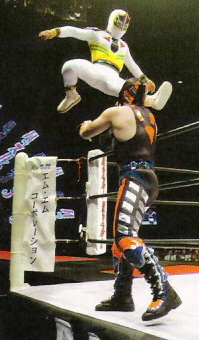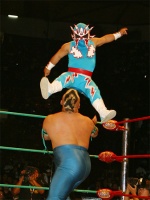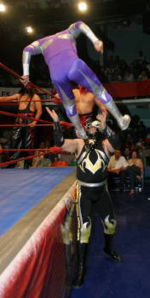Huracarrana: Difference between revisions
mNo edit summary |
mNo edit summary |
||
| Line 8: | Line 8: | ||
The move (or a similar variation) is known as a ''frakensteiner'' in the US after [[Scott Steiner]]. [[Rey Misterio Jr.]] brought this move to prominence in the United States. The frankensteiner does not end into rana. | The move (or a similar variation) is known as a ''frakensteiner'' in the US after [[Scott Steiner]]. [[Rey Misterio Jr.]] brought this move to prominence in the United States. The frankensteiner does not end into rana. | ||
<Br clear=all> | <Br clear=all> | ||
{{Gallerywide|name=Frankenofftoprope.jpg}} | |||
{{Gallerywide|name=SlingshotRana.JPG|caption=Slingshot Huracarrana to floor}} | |||
{{Gallerywide|name=springboardrana.gif|caption=[[Rey Misterio Jr.]]}} | |||
[[Category:Flying Moves]] | [[Category:Flying Moves]] | ||
Revision as of 14:40, 24 June 2010
A Huracarrana is a rollup, where the attacker jumps on the attacker's shoulders and pulls them backwards into a cradle. It's a trademark lucha libre move. Huracanrans have be done off the top rope, to the floor, and any place where an attacker can drop down onto a victim. By definition, a Huracanrana ends in as a pin, but versions where the attacker does not hold are still considered huracarranas.
Can be spelled Huracarrana or Huracanrana. The name comes from it's inverter, Huracan Ramirez (Daniel Garcia). The ending pin is called a rana in lucha libre, so Ramirez special pinning move became known as the Huracanrana.
The move (or a similar variation) is known as a frakensteiner in the US after Scott Steiner. Rey Misterio Jr. brought this move to prominence in the United States. The frankensteiner does not end into rana.




